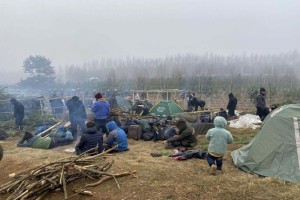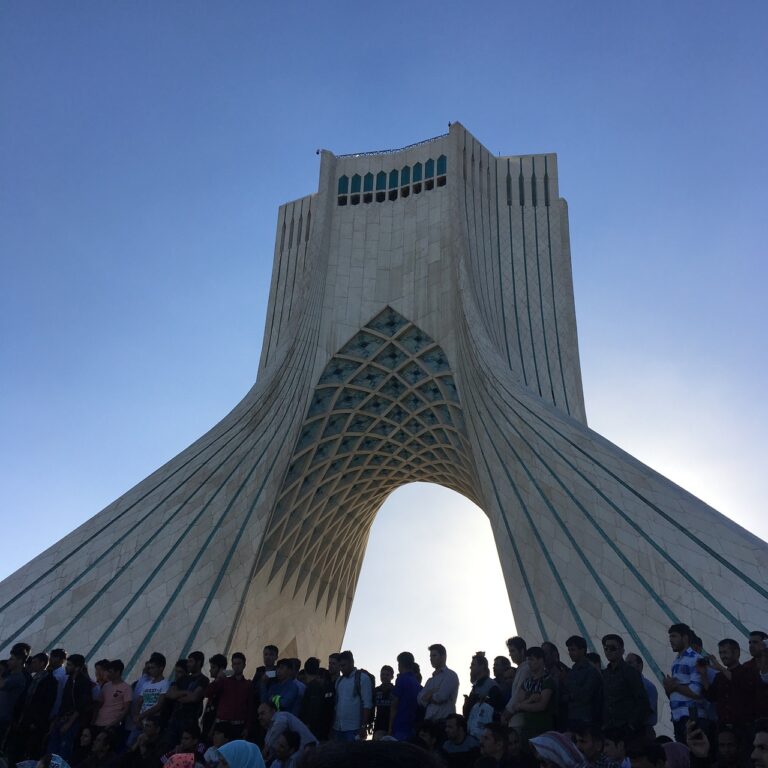
Refugees and migrants stranded at the Belarus border. © UNHCR/Katsiaryna Golubeva
Refugees and migrants stranded at the Belarus border. © UNHCR/Katsiaryna Golubeva
Washington D.C./New York/Moscow: The G7 foreign ministers of Canada, France, Germany, Italy, Japan, the United Kingdom, and the United States of America, and the High Representative of the European Union today issued a statement condemning the Belarus regime’s “orchestration of irregular migration across its borders”.
The G7 nations stated that Belarus regime’s “callous acts” were putting people’s lives at risk and called on the regime to “cease immediately its aggressive and exploitative campaign in order to prevent further deaths and suffering”.
Demanding that International organisations be provided with immediate and unhindered access to deliver humanitarian assistance, the foreign ministers said they were united in their solidarity with Poland, as well as Lithuania and Latvia, “who have been targeted by this provocative use of irregular migration as a hybrid tactic”.
They further claimed that the actions of the Belarusian regime were an attempt to deflect attention from its ongoing disregard for international law, fundamental freedoms and human rights, including those of its own people.
“We commend the actions of the European Union, which is working closely with countries of origin and transit to put an end to the actions of the (Belarusian President Alexander Grigoryevich) Lukashenko regime. We will continue to work together to hold those responsible to account, and to support civil society and human rights in Belarus,” they stated.
Also read: Many recent deaths make Belarus – Poland border new refugee hotspot
Earlier, at the United Nations headquarters in New York, Stéphane Dujarric, Spokesman for the United Nations Secretary‑General, had quoted officials of the Office of the United Nations High Commissioner for Refugees (UNHCR) who were granted access to the border four times since the beginning of this crisis from the Belarusian side, stating that the makeshift camp at the border was not a safe and suitable place for people and could lead to further loss of life. UNHCR has small offices, both in Minsk and in Warsaw. In the recent visit to a makeshift camp on the Belarusian side of the border near the international border crossing point known as “Bruzgi,” UNHCR and the International Organization for Migration delivered some emergency aid, including hygienic items for children and women, as well as food items.
“UNHCR tells us that more assistance is on the way, such as blankets, warm clothes, gloves, hats and boots, for children. Those are to be delivered by the partner organization, which is the Belarusian Red Cross,” Dujarric said.
UNHCR was currently negotiating more regular access to the border on the Belarusian side, as well as discussing access on the Polish side.
UNHCR and the International Organization for Migration (IOM) have been advocating with the authorities to move people to safe locations away from the border, where they can be provided with adequate assistance and counselling, and where humane solutions can be found according to individuals’ personal situations and needs.
The EU has said that these migrants were being used as pawns by Belarus, and the UN Secretariat held the view that it was clear that, in some ways, they have been instrumentalised, and it wants to make sure that that does not continue to happen.
There were also unconfirmed reports of Polish side using water cannons against the migrants on November 16, , and a UN Secretary- General’s spokesperson said if there was any such treatment, “that would be wrong. There should not be any use of force in dealing with this population”.
Russia’s foreign minister, Sergey Lavrov, called the actions of Polish forces “absolutely unacceptable.” Incidentally, Russian President Vladimir Putin had talked at length about the issue in an interview to Rossiya 1 TV channel on November 13, and defended Belarus saying that the “problems were caused by the West, by the European countries”.
According to Putin, these problems have political, military and economic dimensions. “Military because everyone participated in the Iraq operations, and now there are many Kurds from Iraq [among the migrants]; they had also fought in Afghanistan for twenty years, thus there are more and more Afghans there. Belarus has nothing to do with that. The migrants were also moving via different routes. And it is not surprising that they are now going through Belarus because, as Mr Lukashenko told me, Belarus has visa-free arrangements with the countries of origin.”
Highlighting the economic factors responsible for the crisis, he had said that since there are very high social benefits for migrants in Europe, it was “natural” that people are heading there. “However, when Polish border guards and army troops on the Belarus-Poland border beat up potential migrants and fire combat weapons over their heads, blast sirens and spotlights onto their camps at night, where there are children and women in the final weeks of pregnancy, all that does not go well with the ideas of humanism which supposedly underlie all policies of our Western neighbour,” he had said.
Putil had stated that a solution must be found to suit both Belarus and European countries, including Poland, the Federal Republic and other countries, “because there is too much strain on their social systems. Conditions must be created for employing those people one way or another, and resolve problems between the parties since, as President Lukashenko told me, readmission problems have not been resolved, efforts were suspended on such issues as migrant accommodation, building camps for them, and so on”.
– global bihari bureau





